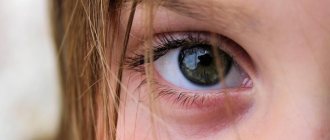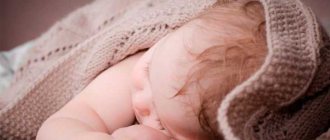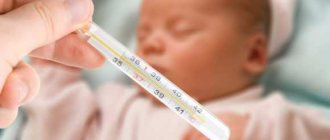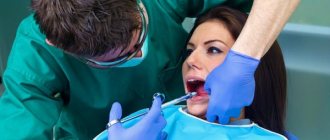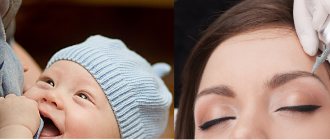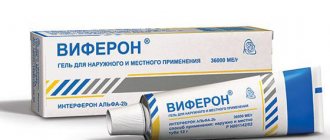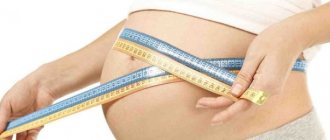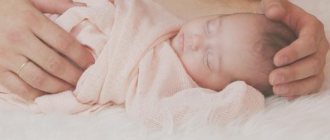When a baby appears in the family, all the attention of loved ones is concentrated on him. Everyone cares about even the slightest external changes or changes in the baby’s mood. Parents want to control everything and properly care for their child. This is why manifestations related to the baby’s well-being that are incomprehensible to parents cause them anxiety.
Many young mothers and fathers do not know why the baby’s head sweats during sleep and whether this phenomenon is a symptom of any disease?” There are several explanations for what is happening to the baby.
Most common reasons
Don’t immediately panic when you notice sweat stains on your baby’s pillow. Perhaps this is not a sign of illness, but the reasons lie in external factors, most of which are easy to eliminate. The main ones are listed below:
- Clothing made from synthetic or low-quality materials. It does not allow air to pass through well, so the child's body sweats while he moves and plays. Increased secretion is fraught with allergic reactions and the occurrence of prickly heat. It is worth choosing clothes more carefully, paying attention to natural materials - linen, cotton with a small amount of elastane, so that things stretch and do not tear quickly.
- Fatigue. Its signs are causeless crying, whims, yawning. It can increase sweating and cause problems with regulating the baby's temperature.
- Mistakes in baby skin care. Extremes are dangerous - rare or frequent bathing, refusal of cosmetics, or the use of several lotions and creams at once.
- Feather pillows and wool blankets. These are not the best materials for a baby’s bedroom, especially in the warm season - they give a “greenhouse effect”. The baby gets hot and sweats.
- Overheating. Overprotective parents try to wrap up the child “so that it doesn’t get drafty,” even if the temperature in the room has exceeded twenty degrees. Because of this, the sweat glands are activated and secrete a lot of secretions. A clear sign that the baby is hot is that he fidgets, is capricious, his face turns red, and his arms and legs become hot. Parents should ensure that the temperature and clothing are appropriate - overheating increases the risk of death.
- Physical exercise. Increased activity provokes increased work of the sweat glands. Even breastfeeding can be a burden for a baby - he puts in more effort than when drinking milk from a bottle.
- Pills. Some medications can cause profuse sweating. In these cases, the sweat smells a little like medicine. Dosages and age restrictions should not be ignored - even incorrectly taken vitamins increase secretion.
- Excess weight. Overweight children sweat more profusely than children of normal weight. Any physical activity is more difficult for them, and secretion may be disrupted.
- Heredity. If relatives have had problems with excessive sweating, it can be passed on to their children.
- Changes in hormonal levels. After birth, the baby is not adapted to new, aggressive conditions for some time. The body needs time to get used to it, to establish the functioning of all systems, including thermoregulation.
A healthy baby's head sweats mainly due to the fact that secretion has not yet been regulated, and this is quite normal. If the cause is not illness, then the sweat should not have a strong unpleasant odor. When it appears, you need to consult a doctor.
Hyperhidrosis as a symptom
In addition to external factors, there are also internal reasons for which a baby’s head sweats during the feeding period. Hyperhidrosis can be a symptom of the disease.
Rickets
When a baby's head sweats, the first thing to rule out is rickets. If it is present, other symptoms will also be observed:
- sleep disturbance, tearfulness, shuddering;
- foul odor of urine;
- nervous state;
- irritation on the child’s skin, bald patches on the head;
- When examined by a specialist, softness of the skull bones is noted.
Tests and a full examination will help establish a diagnosis. The doctor will prescribe vitamin D for the baby for therapeutic and preventive measures.
Important! It is advisable to eliminate rickets at the initial stage of development. If the baby's head sweating is increased, you need to consult a pediatrician and make sure that everything is in order.
Nervous system disorder
With nervous excitability, sweating and anxiety are signs of the disorder. The baby's head, forehead, legs, and arms usually become wet. The baby does not sleep well, there is lethargy, fatigue, and concentration is impaired.
If the specialist has not found any serious neurological features in the body, and has diagnosed increased excitability, then no medication will be needed. It will be enough to use soothing infusions and follow a daily routine.
Vegetative-vascular dystonia
When the functioning of nerve cells and fibers is disrupted, the intensity of blood vessels decreases. Timely measures will help eliminate the problem, and this is important to do, since unpleasant consequences cannot be avoided.
Parents should be more attentive to the fact that the baby's head sweats a lot while sucking on the breast. In addition, the disease is accompanied by pale skin, loss of body weight, heavy breathing, and decreased appetite.
Elimination of external causes and prevention of sweating
Some factors are easy to eliminate. To prevent excessive sweating, it is enough to follow these measures:
- Monitor the temperature and humidity level in the child's room. The best temperature is about 20-22 degrees, and humidity is no more than 70%. If the air is very hot and dry, the baby may become hot and sweat.
- Choose natural bedding and clothing. It is advisable that there are no bright patterns on the fabric. Mom should also wear cotton or linen clothes when she is going to feed her baby.
- It is recommended to change bedding as it gets dirty. You need to wash clothes and children's clothes separately from adults' clothes, choosing the appropriate washing powder. Pay attention to hypoallergenic options that are safe for delicate baby skin. Linen should be ironed well - heat treatment kills parasites that live in the fabric and are dangerous to the health of the baby.
- Do not overwrap your baby. Warmer doesn't always mean better. There is no need to wear a hat when the room is warm enough. Overheating will only make things worse for your child.
- Watch your diet. If the baby was born and weighed more than four kilograms, there is a possibility of a rapid increase in body weight in the future. In such situations, it is worth introducing complementary foods later and consulting with a doctor who will help prescribe the right diet. Excess weight is the cause of many diseases, including diabetes, so you should not feed your child.
- See your doctor regularly. The pediatrician monitors your health, suggests what tests need to be done, and recognizes possible diseases. If the cause of profuse sweating is a disease, there is a chance to cure it in the early stages. When secretion has increased due to factors that are not dangerous to the life and health of the baby, you can normalize it by adding decoctions of oak bark, chamomile or string to the bath. The doctor will also tell you what frequency and dosage to do this with.
USEFUL INFORMATION: Drowsiness during pregnancy: when does it go away, how to deal with sleepiness
Komarovsky's advice for preventing hyperhidrosis in infants
To prevent sweating in young children, Dr. Komarovsky advises resorting to a number of simple but useful actions. First of all, it is necessary to create the correct temperature conditions in the baby’s room. You need to ventilate it at night and in the morning, at least twice a day, regardless of the season. Sleepwear and bedding should be made only from natural materials, without dyes.
Regular use of water procedures is necessary if the baby's back sweats during sleep. If your child takes a bath before bed for a month, this will significantly reduce his sweating.
Dr. Komarovsky advises hyperactive children to have a relaxing massage before bedtime. A couple of times a week you can take warm baths with a decoction of herbs, such as motherwort, mint, and valerian.
When to see a doctor urgently
Increased sweating in some cases is an “alarm bell” for parents. A child may have a sweaty head due to diseases:
- Infections that a baby contracts in the womb or during childbirth. Their causative agents are bacteria, parasites and viruses. Sweating of the head, especially in the forehead and back of the head, is a possible sign of chlamydia, mycoplasmosis, congenital toxoplasmosis and other infections.
- Acquired infectious diseases. These include colds, the symptoms of which are cough, runny nose, and fever. The baby loses his appetite, he becomes lethargic, capricious, and his body does not digest food well. At the same time, the child often sweats, and wet spots remain on the pillow.
- Diseases of the endocrine glands (thyroid, pancreas). At night, the baby produces cold sweat, weak and restless sleep.
- Problems with the liver and kidneys.
- Heart diseases. Their signs are easy to recognize - passivity, anxiety of the baby, pallor and blueness in the area of the lips and nose, profuse release of cold sweat during meals and at night. The hands, feet and head sweat the most.
- Malfunctions of the central nervous system. The baby is irritable, easily excited and cries frequently. At night my head sweats a lot.
Consultation with a doctor is necessary if, even in a calm state, the child’s head becomes covered with sticky cold sweat, from which an unpleasant odor emanates. Increased anxiety, lethargy, apathy, and lack of appetite are a good reason to get tested for diagnosis and timely treatment.
Why is vitamin D deficiency dangerous?
Another reason for increased sweating is a lack of vitamin D in the body. Because of this, some children develop rickets. The exchange of calcium and phosphorus in the body is disrupted, and disruptions occur in the formation of the skeletal system. To prevent the development of the disease, you should monitor your baby and consult a doctor at the first alarming symptoms.
USEFUL INFORMATION: Numbness of the body during sleep: possible causes and treatment
The following signs indicate that the body may lack vitamin D:
- restlessness during sleep - the baby constantly cries and tosses and turns;
- panic from sharp, loud sounds, general increased irritability;
- sour smell in urine;
- sweating of the palms, feet, head during eating and sleeping, the sweat is usually cold.
The initial stage of rickets can also be tracked. It is characterized by:
- frequent sleep disturbances;
- decreased appetite;
- the appearance of bald patches in the occipital region;
- increased sweating.
If alarming symptoms are not noticed in time, irreversible changes will occur in the child’s body - improper bone formation, curvature of the spine and legs, flat feet and others. There is a danger of delayed development of psychomotor skills and disruptions in the functioning of internal organs.
Features of a child during sleep
Parents often notice that the baby’s head sweats during sleep, and the baby wakes up with absolutely wet hair. Having seen this phenomenon in their child, some mothers and fathers take it calmly, believing that everything will go away on its own, while others begin to sound the alarm. The behavior of the second parents is more correct and understandable; they are worried about their little “sun”.
Therefore, it is very important to understand why this happened. First of all, look at what your baby is dressed up in.
- Often, due to excessive excitement, mothers wrap their babies too much, which negatively affects sweating.
- Little children rest much longer at night than adults, so it is during this period that the little ones sweat very profusely.
- If you wrap a child in warm clothes for a night's sleep, this can lead to overheating, a very dangerous phenomenon for the child's body.
- The wrong choice of clothing is a common, but at the same time harmless, cause of foggy head in a newborn. Unfortunately, children often sweat due to problems with the cardiovascular system and apnea syndrome.
